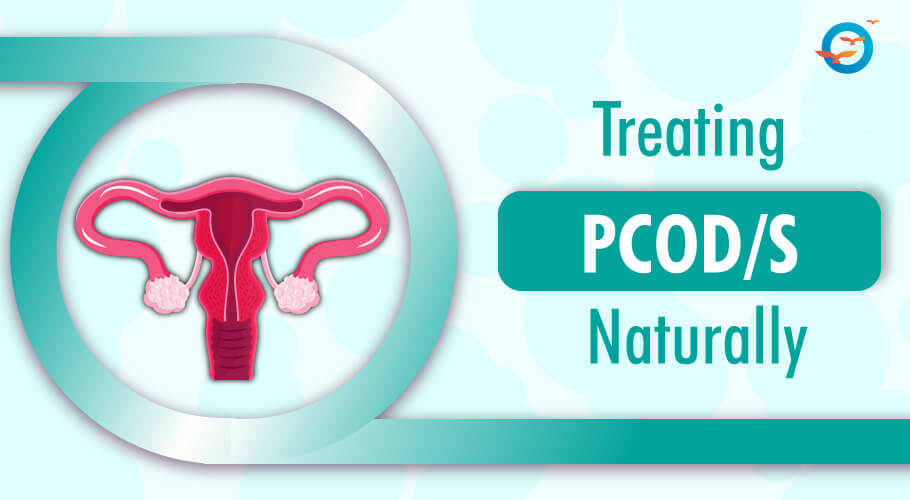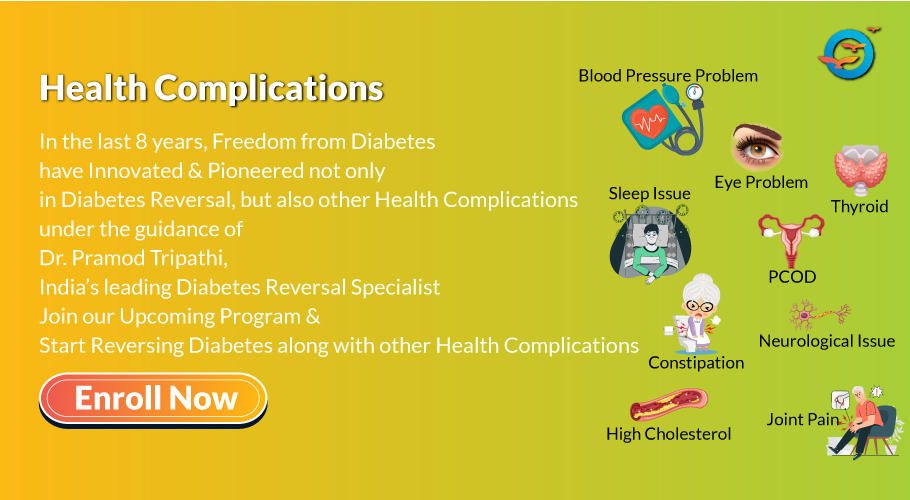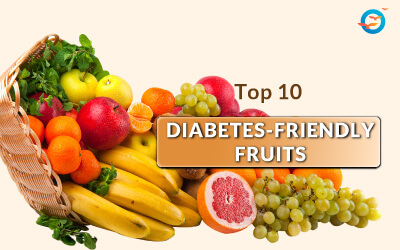Treating PCOD | PCOS Naturally

How To Treat Pcos or Pcod Naturally?
While urbanization and rising standards of living have brought several conveniences to our lives, they are also responsible for the rising tide of so-called lifestyle disorders: diabetes, BP, cholesterol, PCOD/PCOS, etc. At the root of all these health problems lies insulin resistance and hormonal imbalance.
Unhealthy diets, lack of physical exercise, bad sleep hygiene, high-stress levels, and obesity… all ultimately lead to insulin resistance—a situation wherein the body is unable to produce the required insulin, or use the insulin produced in its pancreas, to move glucose in the blood to the muscle cells where they are needed to produce energy.
Polycystic Ovary Syndrome (PCOS) and Polycystic Ovary Disorder (PCOD) are both a result of problems in the endocrine system and are now the most common health issue facing women of childbearing age. The condition is characterized by ovarian cysts that interfere with the woman’s body to produce mature eggs.
In addition to ovarian cysts, there are some common symptoms, these include:
- Irregular menses
- heavy bleeding during periods
- Acne
- Hirsuteness or hair loss
- Weight gain
The best approach to this health problem is to rebalance the body through diet improvement, physical activity and stress management. In this article, we look at ten decisive ways you can treat PCOD/PCOS holistically.
Nutrition is key to good health. When you give your body the nutrients it needs it is better able to regulate hormones, which means your menstrual cycle will get on track. Correct nutrition also helps ward off inflammation, neutralize free radicals, improve your gut bacteria, and lose weight and more. Food sources are without a doubt the best way to get the nutrients your body needs.
Some dietary changes you can start implementing immediately are:
10 Best Natural Treatments for PCOD or PCOS
1. Eat more whole foods
These are natural, unprocessed foods, like fruits, vegetables, whole grains, legumes, nuts and seeds. Among these foods, you must try to include as many anti-inflammatory foods as possible. This is because polycystic ovary problems are linked to inflammation in the body, and anti-inflammatory foods, like tomatoes, leafy greens, nuts, and cruciferous vegetables fight inflammation and help ease symptoms.
2. Include iron-rich foods
Heavy bleeding is one common symptom of this disorder, and it can cause anemia from iron deficiency. You can avoid this by including iron rich foods like spinach to your diet. But don’t overdo it as iron overdose can also cause complications. Ask your doctor about how, and how much, iron you should add to your diet.
3. Get more fiber
Fiber—both, soluble and insoluble—are great digestion aids; they provide bulk, and are needed to synthesize certain nutrients as well. Foods like lentils, beans, broccoli, and sprouts are good sources of dietary fiber.
4. Increase Magnesium consumption
Polycystic ovary syndrome has been linked with low magnesium levels. Increasing your uptake of magnesium is recommended to ease symptoms of this disorder.
5. Cut out caffeine
Caffeine is known to affect hormone levels—estrogen in particular. So cut down or cut our coffee; if you find this too hard, try replacing coffee with green tea instead.
6. Eat androgen-regulating herbs
Certain herbs are known to help regulate androgen—male sex hormones. Consuming these can help ease symptoms by balancing these hormones. Some common ones are: Ashwagandha—aka, Indian ginseng, Tulsi (holy basil), Licorice root, and maca root.
7. Lose weight
Being overweight is one of the biggest risk factors, not just for polycystic ovary disorders, but your health in general. Ensuring your weight is in the healthy range is essential to decrease insulin resistance and thus reduce your risk of PCOD/S
8. Exercise regularly
Exercise is necessary—not just to lose weight but for your health in general. Exercise is known to be a de-stressor; it boosts serotonin (the feel good hormone), improves heart health, builds muscle mass, builds balance and flexibility, and improves immunity in general. You should aim to include a mix of cardio exercises with resistance training (using weights or bodyweight movements) and low impact exercises like Yoga or Pilates.
9. Reduce stress
When you get stressed, the body releases adrenaline and cortisol. This is not a bad thing, as it helps us deal with situations that require heightened senses and physical abilities, which is why they are known as fight-or-flight hormones. Usually, when the stress trigger goes away, hormone levels also drop. However, if one is subjected to constant, continuous stress, it affects insulin sensitivity and sets the stage for insulin resistance, and all the problems that come with it—of which PCOD is just one.
- Ways to manage stress
Get some gentle exercise like Yoga. Yoga–poses, coupled with meditative breathing–offer a mindful route to distressing.
- Meditate
There are many ways to meditate and just as many how-to videos on the internet. Choose one that suits you, and practice it daily. The important thing is to do it regularly—at the same time, preferably in the same place.
- Stop or reduce coffee intake
Cutting caffeine is known to lower stress levels, so reduce or, better yet, cut it out completely.
10. Sleep
One of the most natural, yet ignored health balancers we have is sleep. Sleep nourishes, repairs, rejuvenates; but modern lifestyles have disrupted this natural act, causing chronic health problems. If you find it hard to get the required 7 to 9 hours, try the following:
- Establish a regular bedtime routine: this can include, bathing, meditating, prayer, etc.
- Avoid late meals and alcohol at least 2 hours before sleep time
- Set a no-screen time period that starts about 2 hours before bedtime, and ban these devices from your bedroom
- Lower ambient temperature
- Draw the shades: We all have a natural sleep-wake cycle and light is known to trigger this through a hormone known as melatonin. Darkening the room allows the hormone to do its job, and put you to sleep.
The best “treatment” is a reversal
At the heart of all non-communicable chronic diseases, be it diabetes or PCOD, like insulin resistance. Easing this has been shown to reverse many related problems. But sustaining the change requires a deep transformation in one’s lifestyle. FFD’s Holistic Transformation Program offers a scientific, guided program that has helped more than 12000 participants with a range of insulin-resistance-related disorders completely reverse their diabetes, get off medicine and lead totally normal lives. You can find more information about the program and register for it at www.freedomfromdiabetes.org
FAQs
What are natural ways to treat PCOD/PCOS?
Natural treatments include a balanced diet, regular exercise, stress management, and herbal remedies like cinnamon, spearmint, and fenugreek.
Can lifestyle changes help with PCOD/PCOS?
Yes, maintaining a healthy weight, staying active, and eating a nutritious diet can help manage symptoms and balance hormones.
What foods are good for managing PCOD/PCOS?
Foods rich in fiber, lean protein, and healthy fats, such as leafy greens, whole grains, and nuts, are beneficial for PCOD/PCOS.
Are there any home remedies for PCOD/PCOS?
Yes, some home remedies include drinking spearmint tea, taking apple cider vinegar, and using supplements like inositol.
How can exercise help in managing PCOD/PCOS naturally?
Regular exercise helps reduce insulin resistance, balance hormones, and maintain a healthy weight, which can alleviate PCOD/PCOS symptoms.


